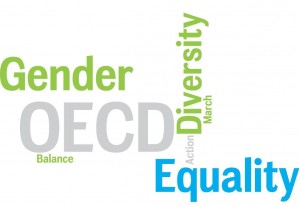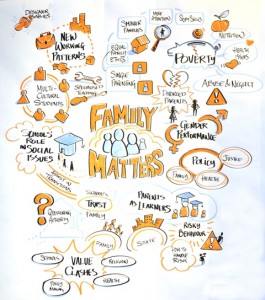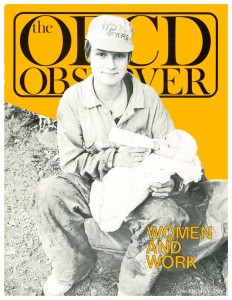International Women’s Day 2016: March on Gender at the OECD
Table of Contents
- 1 Events
- 1.1 8 March 2016: Conference on improving women’s access to leadership: what works?
- 1.2 9 March 2016: High-level Event: “2030 Agenda: Gender Equality, Social Norms and Inclusive Growth”
- 1.3 23 March 2016: “Taxing Him, Taxing Her: How Tax Systems Affect Men and Women Differently”
- 1.4 29 March 2016: Panel: ‘Who, me?’ How women and men approach their careers
- 2 Ongoing work on gender
- 2.1 Education
- 2.2 Employment and Health
- 2.3 Entrepreneurship
- 3 Key links: more information on OECD’s work on gender
- 4 Selection of ‘OECD Observer’ articles
- 5 External links
Events
See what events the OECD is organising to celebrate International Women’s Day 2016!
8 March 2016: Conference on improving women’s access to leadership: what works?
14:00 – 18:00, OECD Conference Centre
This conference hosted by the OECD will foster a policy dialogue on including women in decision-making positions, and the impact on broader social and economic outcomes. It will identify the risks, opportunities and necessary conditions of different policy choices for closing gender gaps in public institutions and companies. In working towards gender equality, while governments can lead by example – thus promoting a mind shift and a cultural change in societies – the corporate sector can support global progress in a way that governments cannot. The event will highlight comparative lessons learned from both sectors, helping to enrich the global debate on this essential public policy issue. It will also provide an opportunity to launch the recently adopted OECD Recommendation of the Council on Gender Equality in Public Life and contribute to the effective implementation of the G20/OECD Principles of Corporate Governance.
More information and registration
9 March 2016: High-level Event: “2030 Agenda: Gender Equality, Social Norms and Inclusive Growth”
15:00 – 17:00, Auditorium, OECD Conference Centre
The OECD Development Centre is organising a high-level event to commemorate International Women’s Day and the 60th anniversary of the UN Commission of the Status of Women (CSW). The event will be moderated by Daniel Yohannes, Ambassador and Permanent Representative of the United States to the OECD. High-level panellists include:
- Irina Bokova, Director-General of UNESCO;
- Pierre Duquesne, Chair of the Development Centre Governing Board, Ambassador and Permanent Representative of France to the OECD;
- Maria del Carmen Squeff, Argentine Ambassador to France
- Gabriela Ramos, OECD Chief of Staff and Sherpa to the G20; and
The panel will focus on the SDGs and the CSW theme of sustainable development and empowerment of women. The speakers will discuss their vision of gender equality for 2030 and offer their organisations’ and countries’ roadmaps to achieving the ambitious targets of 2030 Agenda, in particular the economic empowerment of women. There will be a question and answer session with the audience.
Please register on EMS or by emailing Ms. Rico de la Viesca (virginia.ricodelaviesca@oecd.org)
23 March 2016: “Taxing Him, Taxing Her: How Tax Systems Affect Men and Women Differently”
11:30 – 13:00, OECD Conference Centre Auditorium
Tax systems can affect men and women in different ways. In OECD countries today, this rarely takes the form of explicit differences, but rather arises from the interaction of the tax system with other patterns of economic behaviour, including differences in labour participation, entrepreneurship, wage rates, education decisions, property ownership, and consumption.
This event will identify some of the different impacts of the tax system on men and women. The panel will consider whether the tax system should try to redress these impacts, or the underlying gender differences themselves, as well as the consequences of doing so for other aspects of good tax design, including equity, simplicity, and economic growth.
Panellists:
- Grace Perez-Navarro, Deputy Director, Centre for Tax Policy and Administration
- Catherine Mann, Chief Economist, Economics Department
- Andreas Schleicher, Director, Directorate for Education and Skills
- Mark Pearson, Deputy Director, Directorate for Employment, Labour and Social Affairs
- Brenda Killen, Deputy Director, Development Co-operation Directorate
Please register on EMS. For more information, please contact: Michelle.Harding@oecd.org and Anna.Milanez@oecd.org.
29 March 2016: Panel: ‘Who, me?’ How women and men approach their careers
12:00 – 13:30, OECD Conference Centre Auditorium
Know a young woman who doesn’t speak up in meetings, even if she has the right answer? Know a young man who always speaks up, even if he doesn’t have the right answer? Join us for a fascinating panel discussion on the role of confidence in women’s (and men’s) career advancement in challenging fields. The gender gap in confidence to study and work in STEM fields has far-reaching consequences for women’s participation in the labour market, and contributes to gendered job segregation, wage gaps, and skill mismatch. Experts from finance, computing, aid and advocacy, and innovation will discuss the benefits – and limitations – of self-confidence in career choices and advancement.
With the participation of:
- Victoria Song, Forbes “30 under 30” Venture Capitalist and founder of “So She Did,” a non-profit promoting young women’s investment in themselves
- Olivier Crouzet, Dean of Studies at Ecole 42, a revolutionary French computer programming school
- Amanda Lundy, Global Advocacy Advisor for Girls’ Rights at Plan International and the “Because I am a Girl” initiative
- Andrew Wyckoff, Director of OECD Directorate for Science, Technology and Innovation
- Moderated by Monika Queisser, Senior Counsellor of OECD Directorate for Employment, Labour, and Social Affairs and Head of Social Policy
Please register here if you would like to attend the event or contact Ms. Elma Lopes, elma.lopes@oecd.org
Ongoing work on gender
Education
-
Trends Shaping Education 2016 provides an overview of key economic, social, demographic and technological trends and their potential links to education. It uses a variety of robust international sources of data, including the OECD, the World Bank and the United Nations. The 2016 edition looks at the changing role of women and work and women’s entrepreneurship. A special chapter explores the transformation of the modern family: over the past 50 years the number of reconstituted families and single parent households has risen, families have become smaller and individuals are deciding to have children later in life, or not at all. Numbers of divorces are rising even as marriage rates are declining. All of this is important to women’s life choices. The chapter looks at the impact modern families might have on education as a whole, from early childhood education and care through to tertiary education.
- The Trends Shaping Education Spotlight on Gender Equality takes an in-depth look at gender equality across the OECD, including educational attainment and career aspirations and the persistent challenges and stereotypes that seem to affect them. It also explores gender equality in the teaching force itself, which continues to have a high proportion of male headmasters despite the feminisation of the profession. It suggests a number of ways that education can affect – and be affected by – these trends.
Employment and Health
- Work has started in preparation for the 2017 Meeting of the OECD Council at Ministerial Level on progress with the implementation of the OECD Gender Recommendation.
- Work is under way on the OECD Gender review of Mexico which also focuses on women in public life (see below) and a study focusing on promoting equal sharing in families in couple families, in co-operation with the German Family ministry. Both these studies will be released in 2016.
- The OECD Employment Outlook 2016 includes an analysis of the labour market position of women in emerging economies.
- In November 2015 the OECD released a study on Paid Parental Leave: Lessons from OECD Countries and Selected U.S. States.
- Health at a Glance 2015 presents a wide range of indicators on gender differences in health, including in life expectancy, specific causes of death (such as cardiovascular diseases, cancer, violent deaths, etc.), cancer incidence, self-reported health status, smoking and obesity.
- Tackling Harmful Alcohol Use looks at the gender gap and socioeconomic gap in risky drinking that affects employment, productivity and wages: less educated and lower socioeconomic status men, as well as more educated and higher socioeconomic status women are more likely to have risky drinking behaviours.
Entrepreneurship
- Women in Business 2014: Accelerating Women’s Entrepreneurship in the MENA Region provides an overview of the status of women’s education, employment and entrepreneurship in 18 MENA economies with a special focus on women’s access to finance and business development services
- The OECD hosts since 2009 the OECD-MENA Women’s Business Forum, a wide network of stakeholders which works in favour of women’s entrepreneurship through conferences and capacity building, both in Paris and in countries of the MENA region: http://www.oecd.org/mena/investment/wbf.htm
- The OECD is leading an innovative project to explore how the legal environment influences women’s access to the economy in 6 MENA countries (Algeria, Egypt, Jordan, Libya, Morocco and Tunisia). It examines the impact and implementation of legal dispositions, and will provide policy recommendations to help build enabling legal frameworks. It will complement the findings of the OECD publication “Women In Public Life : Gender, Law and Policy in the Middle East and Africa 2014”. Building from local research and through national and international consultations, this work will result in a report, “Supporting women as economic actors during the transition period” , to raise awareness of the economic and social returns of increasing women’s employment and entrepreneurship.
Key links: more information on OECD’s work on gender
- The OECD Gender Data Portal: the portal is updated annually on the occasion of International Women’s Day
- See ongoing OECD work on gender
- Key charts on gender and development
- Key resources
- Explore data from the Social Instistutions and Gender Index (SIGI) on the Gender Data Portal
Selection of ‘OECD Observer’ articles
- Why quotas work for gender equality
- Pay gap
- Forging a gender-balanced economy
- Why a push for gender equality makes sound economic sense
- Closing the gender gap can boost the economy
- Progress for women and girls in the 2030 Agenda for Sustainable Development
- Korea’s work-life balance policies for sustainable growth
- More women on board





